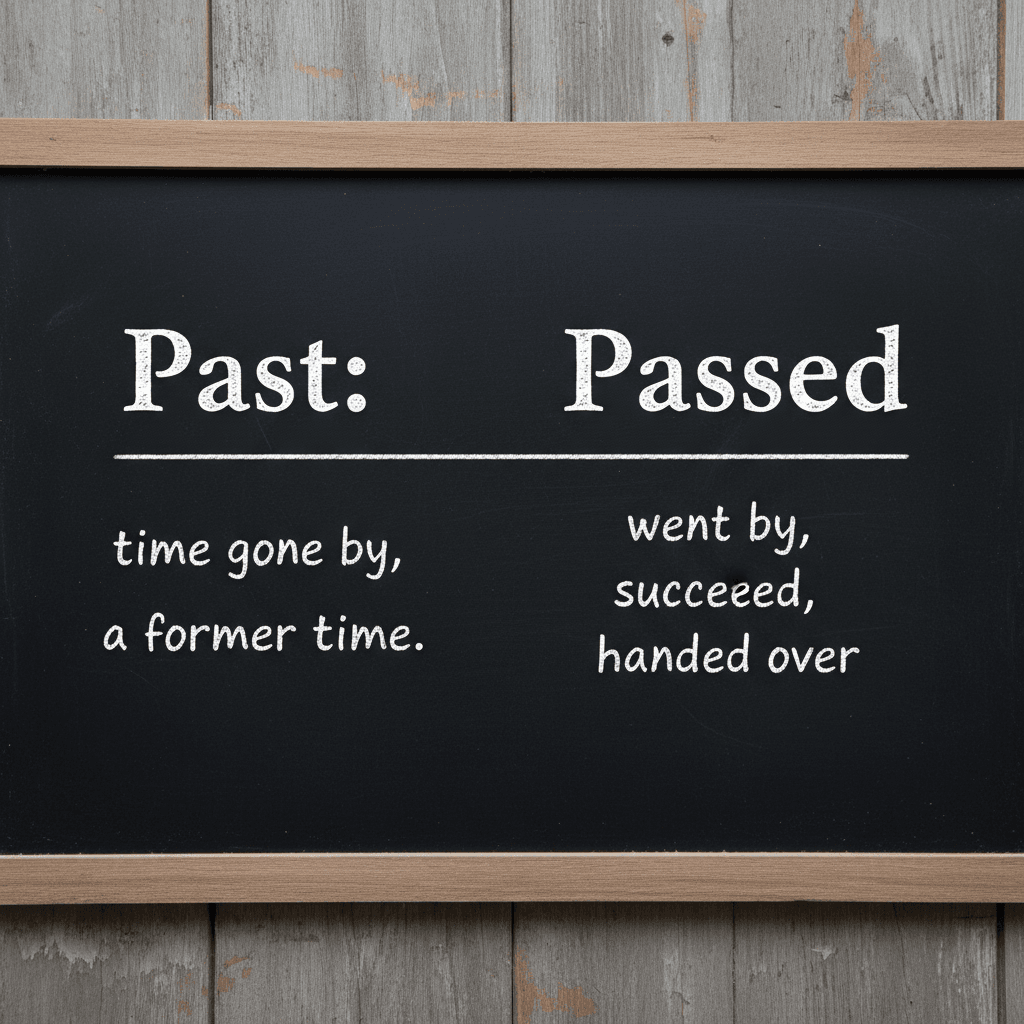Past vs. Passed: What’s the Difference?
 Past and passed are homophones — they sound the same but mean different things.
Past and passed are homophones — they sound the same but mean different things.
The key difference is in grammar:
- Past is usually a noun, adjective, or preposition.
- Passed is always a verb (the past tense of pass).
Let’s go step by step.
Past: A Time or Position
Meaning
“Past” refers to time that has already happened or a position beyond something.
It’s not a verb — it never shows an action.
It can act as a noun, adjective, adverb, or preposition depending on how it’s used.
Examples (10 total)
- Don’t live in the past. (noun)
- It’s already past midnight. (preposition)
- We walked past the store. (preposition)
- The past year has been amazing. (adjective)
- The car drove past the school. (preposition)
- In the past, people used typewriters. (noun)
- He looked past me without saying hello. (preposition)
- That’s all in the past now. (noun)
- Ten minutes past eight. (time expression)
- She’s moved past her fear. (adverb)
🧠 Tip:
If it describes time, a place, or something behind you, it’s past — never passed.
Passed: The Action of Moving or Succeeding
Meaning
“Passed” is the past tense and past participle of the verb “to pass.”
It means to move, go by, hand something, or succeed.
Examples (10 total)
- She passed the exam. (succeeded)
- The car passed us on the road. (moved by)
- He passed me the salt. (handed over)
- Time passed quickly. (went by)
- They passed the ball to each other. (moved)
- We passed three villages on our way. (went by)
- The law was passed last year. (approved)
- She passed away peacefully. (died)
- He passed through customs easily. (moved through)
- I passed my driving test on the first try. (succeeded)
🧠 Tip:
If it’s something you do — an action or event — use passed.
Quick Comparison Table
| Word | Part of Speech | Meaning | Example |
|---|---|---|---|
| Past | Noun / Adj. / Prep. | Time or position | We walked past the park. |
| Passed | Verb | Action or movement | We passed the park on our walk. |
How to Remember the Difference
👉 Past = Time or place (no action).
👉 Passed = Action (something happens).
💡 Memory Trick:
If you can replace the word with “went by”, use passed.
If you can replace it with “beyond” or “earlier”, use past.
Common Mistakes
❌ The time has already passed away midnight.
✅ The time has already past midnight.
❌ We walked passed the museum.
✅ We walked past the museum.
❌ She has past her exam.
✅ She has passed her exam.
Why They’re Confused
They sound exactly the same and both can relate to time or movement.
But only passed is a verb, while past is everything except a verb.
Even grammar checkers miss subtle errors — which is why Humanizey helps detect these tricky word choices automatically and make text sound human and natural.
FAQs
1. Is “past” ever a verb?
No, past is never used as a verb.
2. Can “passed” describe time?
Yes, when you mean time moving by: Two hours have passed.
3. What does “walked past” mean?
It means you moved beyond something — We walked past the store.
4. What about “passed away”?
That’s an idiom meaning died: Her grandfather passed away peacefully.
Practice: Choose the Correct Word (“Past” or “Passed”)
(Answers are listed at the end.)
- We drove ___ the library on our way home.
- Three years have already ___.
- Don’t dwell on the ___.
- The team ___ the ball perfectly.
- She walked right ___ me without saying hi.
- He ___ his driving test on the first try.
- It’s ten minutes ___ noon.
- They ___ several shops before stopping.
- The bill was finally ___.
- That’s all in the ___ now.
Answers
- past
- passed
- past
- passed
- past
- passed
- past
- passed
- passed
- past
